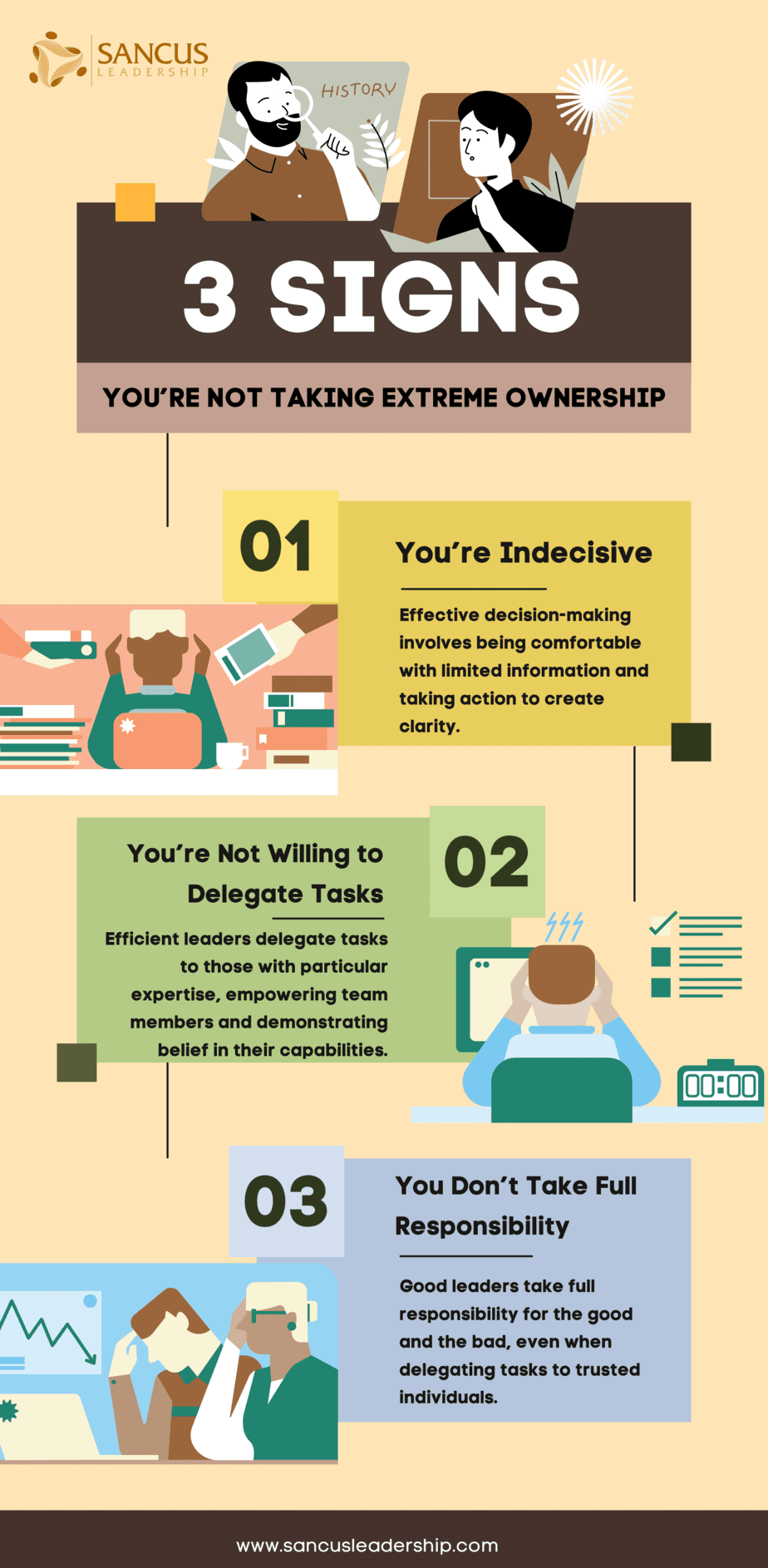Your cart is currently empty!

3 Signs You’re Not Taking Extreme Ownership of Your Business (and Life)
When I was 23 years old, my go-to when something didn’t bear in my favor was to blame it on someone or something else. I used to have a bizarre haircut, and it got blamed for the lack of women in my life (sad, I know). True or not, I did nothing to change my situation. But my life drastically changed the day I decided to take ownership of everything in my life. Taking ownership is a critical skill that will significantly affect how you manage your business and live your life.

Extreme ownership means taking full responsibility for your business and life and focusing on what you can change instead of blaming others. Signs that you need to take more extreme ownership of your business and life include indecisiveness, unwillingness to delegate tasks, and inability to take responsibility.
In this article, I’ll talk about the signs that you’re not taking extreme ownership of your business and life and how these can take a toll on your leadership, management skills, and personal relationships.
1. You’re Indecisive

The ability to make sound decisions promptly is a crucial leadership quality that can make or break a business. Indecisiveness will put your business’ welfare at risk, especially in the face of uncertainty, conflict, and crisis. You must always be on top of things and know how to handle various situations strategically.
Wondering if you are indecisive? The first step is to become self-aware.
Effective decisiveness is about being okay with limited information but still able to make a decision and move forward; action creates clarity.
Effective decisiveness is about being okay with limited information but still able to make a decision and move forward; action creates clarity.
That being said, managing and leading a team doesn’t mean you make all decisions, big and small. You must learn to delegate tasks to competent individuals so the team functions efficiently and synergistically.
Wanting to decide on even the most minor aspects of your business makes you a micromanager, which is not a useful leadership quality.
Our jobs as leaders are to present a what and why but not the how. The how is up to the individual who is closest to the problem. We must trust our team to make the right decisions; we offer feedback and training when they don’t.
Indecisiveness may translate into your personal life and make you feel overwhelmed at times; an excellent tool for improving your decisiveness is the Eisenhower matrix.
Tasks are placed in one of four categories; urgent and important, urgent but not important, important but not urgent, and not urgent and not important. This clearly shows what must be decided here and now and what tasks can wait.
When you want to start prioritizing and making more beneficial decisions on time and minimizing decisions made too late, I invite you to book a call with me to see if we should work together.
2. You’re Not Willing to Delegate Tasks

No matter how skilled you are in leading and managing your team, you will still need other individuals’ help, especially those with a particular field of expertise. The mark of a good leader isn’t one who can do everything all at once. Rather, an efficient leader is one who can delegate to those who can accomplish the tasks the best.
An efficient leader is one who can delegate to those who can accomplish the tasks the best.
Delegation of tasks empowers your team members. It shows them that you believe in their capabilities, which is why you give them autonomy over their work.
The key to practicing extreme ownership and effective delegation is allowing your team members to see the bigger picture. Hence, they understand their unique and significant roles in achieving the goals you’ve set.
Creating a synergistic team is just as crucial in business as in your personal life. Truer words were never spoken than the adage, “No man is an island.” Both in business and life, remember that nobody is entirely self-sufficient. We must all rely on others, one way or another, to succeed.
The Damaging Effects of Micromanagement
The opposite of effective delegation is micromanagement; I think considering why delegation is so important is worth considering.
People generally want enough space and opportunities to do what they think is best. Your team members will undoubtedly appreciate your good management, but they also want to feel they contribute significantly to the business. If you lean toward micromanagement, chances are you’re doing more harm than good.

Here are some of the most damaging effects of micromanagement:
- Team members may feel demotivated. Although team members may appreciate support and advice, they might start feeling utterly powerless if you don’t allow them to make even the smallest decisions about how they should accomplish their jobs.
- Team morale may go down. Making your team members feel that you don’t have faith in their capabilities may make them lose interest in their work.
- Team members may start feeling paranoid. Managing your team too closely may sow seeds of self-doubt in them, especially if you’re constantly scrutinizing every aspect of their work.
- Suppression of creativity and innovativeness. If you expect your team members to follow instructions to a tee, you will hamper their ability to think of ingenious solutions to complex problems. You will also hinder them from thinking outside the box and maximizing their full potential.
3. You Don’t Take Full Responsibility

If you often point fingers whenever something doesn’t go as planned, it may indicate that you’re not taking extreme ownership of your business. Leading a team involves taking full responsibility for every aspect, both the good and the bad, even if you delegate tasks to people you highly trust. Remember that the bottom line is everything, and everyone depends on you.
If you often point fingers whenever something doesn’t go as planned, it may indicate that you’re not taking extreme ownership of your business.
The ability to take full responsibility and ownership of your business will be evident in how you live your daily life. Do you frequently find yourself blaming others, especially the people you love most, whenever things go wrong? Is it easy and almost instinctive for you to put the blame on others in the face of blunders and frustrations?
If so, take it upon yourself to step more into the spotlight and take full responsibility for various aspects of your life and business. Take these failures as learning opportunities to improve yourself and enhance your modes of action and tactics. Show your team (and your friends and family) that you — whether as a team leader, spouse, or parent — are willing to step into the line of fire for the betterment of the people around you.
You are often not the reason why something happened, and you might not even be able to do something about it. But if you approach life with a sense of genuine ownership, the direction of your life, just as mine did, will profoundly change for the better.
Suddenly you are the king of whatever happens, and it’s better to be king than a peasant, especially in a shitty kingdom.
| Signs of Not Taking Extreme Ownership | Description |
| Indecisiveness | The inability to make sound decisions in a timely manner can put a business at risk, especially during uncertain times. Effective decision-making involves being comfortable with limited information and taking action to create clarity. Leaders must trust their team to make decisions while providing feedback and training when needed. |
| Unwillingness to Delegate Tasks | Good leaders delegate tasks to individuals with the right skills and expertise, empowering team members and helping them understand their roles in achieving goals. Practicing extreme ownership involves allowing team members to see the bigger picture and take ownership of their work. |
| Failure to Take Full Responsibility | Effective leaders take full responsibility for the good and the bad, even when delegating tasks to trusted individuals. Blaming others for mistakes and failures indicates a lack of ownership and responsibility. Taking ownership of one’s actions is crucial for success in both business and personal life. |
What Is Extreme Ownership in Business?

Extreme ownership in the business is the idea that you, as the leader, own everything relating to your business. You take full responsibility for each triumph, failure, and obstacle. You can simultaneously manage all aspects despite all that is happening in your professional and personal life.
You should delegate tasks to people you trust but also to those you don’t trust; delegate the less important tasks and let them slowly build confidence back up.
However, remember that you’re still in the driver’s seat, and it’s your job to ensure that the people on your team are aligned with organizational goals.
Extreme ownership is significant because it forces you to focus on your impact on the situation; it’s the difference between focusing on “why the problem arose ” and “how do we fix it.” The first will look for something/someone to blame, and the latter will direct you toward a solution.
Extreme ownership is, in a way, telling yourself, “There are no excuses; I will get it done.”
The book Extreme Ownership: How U.S. Navy SEALs Lead and Win (available on Amazon.com) is an excellent source of information and insights on the value of extreme ownership in your business (and life). The lessons learned from these SEAL officers will help you better manage and lead your team toward success.
